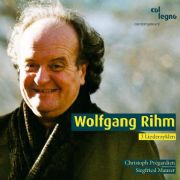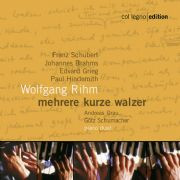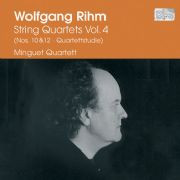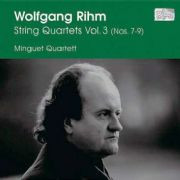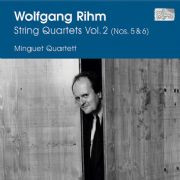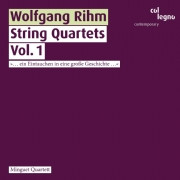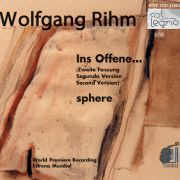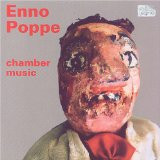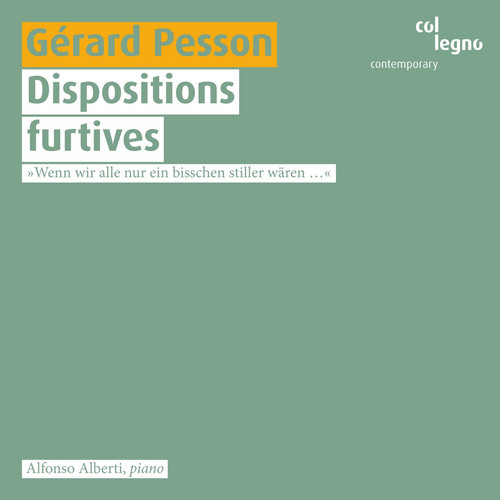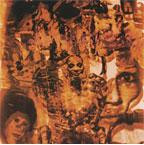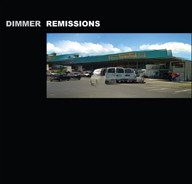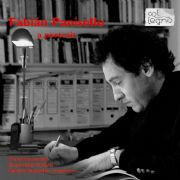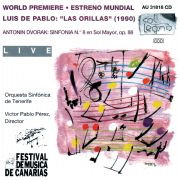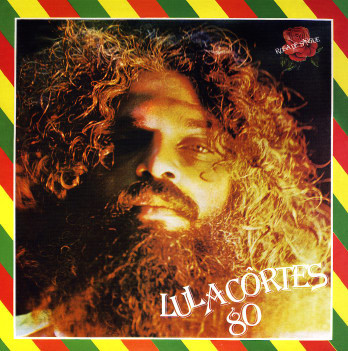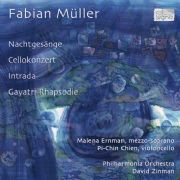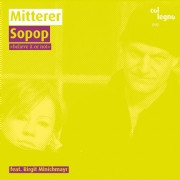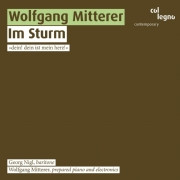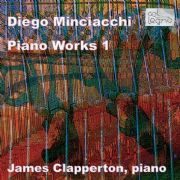3 Liederzyklen
In the three song cycles of this recording, Wolfgang Rihm stays faithful to the text and its meaning while paying close attention to melodic line. In choosing to do so, Rihm has a deep lineage in the great tradition of Romantic art song that stretches back to the distinguished names of Schönberg, Berg, Brahms and Schumann. Approaching the text both from the perspective of the singer and from that of the accompanying pianist, Rihm is able to reach tremendous heights of expression. While the eleve…
mehrere kurze walzer
Franz Schubert may not have been an expert dancer, but he certainly was an extremely skilled composer of dance music. Most of his numerous dances – often miniatures comprising only a few chords – were improvisations created for special occasions, such as house parties. And many of these impromptu waltzes were noted down by Schubert later, including several pieces for piano four hands. Brahms, who held Schubert's music in high esteem, remained faithful to his own majestic musical language in his …
String Quartets Vol 4
The most recent of his compositions which Rihm called “string quartets” date back a few years already, with a gap in the enumeration still waiting to be filled (the eleventh quartet is missing). Even a cursory comparison of the three works’ beginnings reveals Rihm’s “ability to find new and distinctly characteristic solutions for each piece, which, each in their own way, put a stamp on what is to follow.” (R. Frisius) The gentle pizzicati of Quartet No. 10 and the muted, shadowy chord of No. 12 …
String Quartets Vol. 3 (Nos. 7-9)
String Quartets Nos. 7, 8 and 9 suggest that Rihm has finally left behind the neo-romantic expressive pathos of earlier compositions: “Real or virtual allusions to the past are rarely to be found any more – and the same holds of the luscious and revelling strings. Remnants of tonal harmony are, with a few exceptions, almost completely obliterated. … Instead, new constellations come to the fore, emancipated from traditional conceptions of sound – heeding, in particular, the principle of polarity …
String Quartets Vol. 2 (Nos. 5 & 6)
That the two single-movement string quartets No. 5 (“Ohne Titel”) and No. 6 (“Blaubuch”), composed in 1981/83 and 1984, belong to the most passionate of Rihm’s quartets is due to their restless vigor. This impulsive approach is of course always present in his music. But even the tempo indications “fast, restless” and “fast und free” suggest a certain stringency - which is fully realized in the pieces. A sense of inner disquiet pulls the listener like a maelstrom into a sea of commotion, of stru…
String Quartets Vol.1
This CD with … the first four string quartets reflects the interesting path of Rihm’s artistic development. The Minguet Quartet approaches the first two, shorter, works with audibly high concentration without relinquishing, in the frenzy of high-energy playing, their own cultivated sound born from quartet tradition. Here, Rihm’s third quartet, with its not unproblematic subtitle ‘Im Innersten’ (‘at the innermost core’), does not become self-indulgent navel-gazing, the display of sounding extremi…
Ins Offene... / sphere
Enclosing the listener in sonic space: This is what Beat Furrer carried to extremes in his FAMA (col legno 20612), about 15 years after Rihm, by actually placing his audience in a “building of sound”. For Wolfgang Rihm, a sonic space was something less concrete and more indirect: “Organically sprawling strings of sound should be woven around the listener, circling her from different directions. In this way, the listener is not left to her own devices while opening up to it; the piece itself come…
Chamber Music
Against spontaneity and con-sistency: Poppe manages the feat of being both a systematic and a revolutionary composer, one who plays by the rules and beats them at the same time.
Dispositions Furtives
Through the open sound portals created by his compatriot Castiglioni, the Italian pianist Alfonso Alberti first entered col legno's World of New Music; on his second album, he dedicates his sensitive and brilliant musicality to Gérard Pesson's fragile and puzzling fabrics of sound. A selection of piano pieces has been compiled in a joint effort by the pianist and the French composer; in his interpretations Alberti lets us catch glimpses of musical structures as though they were glittering just u…
Double sextet (1975)
Recorded in ann arbor in 1975, this long lost destroy all monsters gem features the group as a sextet (mike kelley, jim shaw, cary loren, jeff fields, kalle nemvalts, and john reed). missing are the lovely lyrics and goth scrawl of niagara but in her place we see the collective brainstorm through 30 minutes of an underground music/non-music and b-culture genealogy that is unmistakably destroy all monsters. a melted mind, reconstructed with duct-tape, bent circuits, saxophone drips, and fuzz that…
remissions
dimmer's "remissions" is the second full-length album from longtime sonic architects of interactive feedback circuits, thomas dimuzio and joseph hammer. this 2xlp effectively represents four side-long pieces from their live shows throughout california taken place between 2006 and 2007.essentially a follow-up to their 2007 album on los angeles' melon expander, "remissions" expands upon the immense recursive tape looping and resampling that is found inherent in their work but achieves a weight and…
a portrait
Karl-Heinz Stockhausen is only one out of several composers with whom the conductor Fabián Panisello has worked. Panisello, among others, has conducted the premiere of Stockhausen’s Hoch-Zeiten. Having studied with composers as diverse as Elliot Carter, Brian Ferneyhough and Luis de Pablo, Panisello was able to draw inspiration from them for his own compositional work, while never allowing them to leave visible footprints. His style developed entirely independently. The present recording brings …
Las Orillas
“It seems most important to me not to stop being a connoisseur; I freely confess that I would rather be considered a hedonist than an analyst.” This statement by Luis de Pablo is reflected in his music; not in violent yet superficial currents of sound but in finely differentiated sound as de Pablo’s Las Orillas (1990) demonstrates: “The composition is very linear, particularly in the slower parts. The orchestration has therefore been planned especially thoroughly such that each voice has a meani…
Magnificence In The Memory
Early archival recordings: brand new release of never-before-heard material from the heyday of Ya Ho Wha 13, featuring the legendary Father Yod and his sons playing improvisational, psychedelic spirit music recorded in the wee hours of morning meditation. Father was a wealthy man, with a rich inner life, a family of disciples that loved him, many, many women and seemingly unlimited power. So why at the height of his success, did he choose to spend his time playing rock and roll? Having a band in…
Rosa De Sangue
Digital version in a heavy mini LP style cover with exact reproduction of the original artwork, and a full color foldout mini poster insert with new liner notes by Lula Cortes. Edition of 1000 copies." "First ever reissue of this Brazilian private press monster rarity. Originally custom pressed in 1980, Rosa De Sangue is the closing chapter of the amazing Recife psychedelic movement that flourished and centered around the work of Lula Cortes, beginning in 1973 with the release of Satwa, and the …
Nachtgesänge / Konzert für Violoncello und Orchester / Intrada /
Young Müller (b. 1964, Switzerland) writes in a consistently romantic style — unexpected col legno fare! Perhaps Sterling should have released this. The warm Hesse settings, Nachtgesänge, could be mistaken for Szymanowski or Zemlinsky; indeed, Ernman sounds as though she’d be ideal in a Strauss opera. Darkly emotional, the single-movement cello concerto taps Shostakovich and Lutoslawski’s pathos; the idée fixe’s colorful unfolding reminds the listener of Dutilleux. Müller maintains his anachroni…
Sopop
Wolfgang Mitterer, the acclaimed contemporary composer and great experimenter, has embarked on a journey into the world of pop, writing songs and lyrics and mixing whatever there is to mix. The new album produced by this cheerful commuter between musical genres provides the perfect sound for all locations, whether you're looking for underground music or tracks for your favorite techno clubbing, discotheque or jazz club. And the perfect sound, too, for actress Birgit Minichmayr, celebrated star o…
Im Sturm
Plunge into the world of Franz Schubert one more time, compose lieder full of "Storm and Stress," drenched with longing for love and world-weariness – Wolfgang Mitterer, the much-praised organist and composer specializing in electronic music, has written songs after Schubert. Now his cycle of lieder for baritone, prepared piano and electronics, entitled Im Sturm, "In the storm," also rages on CD. Naturally, this is a storm intermingled with undercurrents of irony, and an understanding of Romanti…
Das tapfere Schneiderlein
Drop the usual children's opera platitudes, add a liberal measure of cheek – result: a smart musical comedy, young and saucy, just like the brave little people that go about their business here. Do the children today know at all what this fairytale is about? Well, if they don't, Wolfgang Mitterer will bring it home to them, with just a few characteristic instruments: double bass, samples, synthetic sounds. Elisabeth Rombach as the little tailor takes to the road boldly and merrily, parading the …
Piano Works 1
Composer and neurologist Diego Minciacchi is as likely to publish a paper on motor skills as he is to compose music that mixes scientific and poetic ideas; yet this fact should not intimidate listeners new to his work, who might worry that the compositions on this 2005 release from Col Legno are too cerebral or complicated to appreciate. What they should know upfront, however, is that Minciacchi is a product of the generation of composers who absorbed the lessons of the 1960s and '70s avant-gard…
